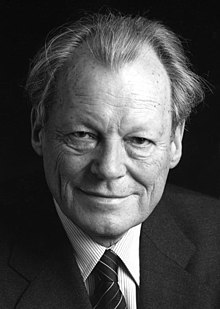
Back Willy Brandt Afrikaans Willy Brandt ALS Willy Brandt AN ويلي براندت Arabic فيلى براندت ARZ Willy Brandt AST Villi Brandt Azerbaijani ویلی برانت AZB Willy Brandt BAR Вілі Брант Byelorussian
Willy Brandt | |||||||||||||||||||||||||||||||||||
|---|---|---|---|---|---|---|---|---|---|---|---|---|---|---|---|---|---|---|---|---|---|---|---|---|---|---|---|---|---|---|---|---|---|---|---|
 Brandt in 1980 | |||||||||||||||||||||||||||||||||||
| Chancellor of West Germany[a] | |||||||||||||||||||||||||||||||||||
| In office 22 October 1969 – 7 May 1974 | |||||||||||||||||||||||||||||||||||
| President | Gustav Heinemann | ||||||||||||||||||||||||||||||||||
| Preceded by | Kurt Georg Kiesinger | ||||||||||||||||||||||||||||||||||
| Succeeded by |
| ||||||||||||||||||||||||||||||||||
| Leader of the Social Democratic Party | |||||||||||||||||||||||||||||||||||
| In office 16 February 1964 – 14 June 1987 | |||||||||||||||||||||||||||||||||||
| Federal Manager | |||||||||||||||||||||||||||||||||||
| Preceded by | Erich Ollenhauer | ||||||||||||||||||||||||||||||||||
| Succeeded by | Hans-Jochen Vogel | ||||||||||||||||||||||||||||||||||
| Vice Chancellor of West Germany | |||||||||||||||||||||||||||||||||||
| In office 1 December 1966 – 22 October 1969 | |||||||||||||||||||||||||||||||||||
| Chancellor | Kurt Georg Kiesinger | ||||||||||||||||||||||||||||||||||
| Preceded by | Hans-Christoph Seebohm | ||||||||||||||||||||||||||||||||||
| Succeeded by | Walter Scheel | ||||||||||||||||||||||||||||||||||
| Minister for Foreign Affairs | |||||||||||||||||||||||||||||||||||
| In office 1 December 1966 – 20 October 1969 | |||||||||||||||||||||||||||||||||||
| Chancellor | Kurt Georg Kiesinger | ||||||||||||||||||||||||||||||||||
| Preceded by | Gerhard Schröder | ||||||||||||||||||||||||||||||||||
| Succeeded by | Walter Scheel | ||||||||||||||||||||||||||||||||||
| Governing Mayor of West Berlin | |||||||||||||||||||||||||||||||||||
| In office 3 October 1957 – 30 November 1966 | |||||||||||||||||||||||||||||||||||
| Mayor | |||||||||||||||||||||||||||||||||||
| Preceded by | Otto Suhr | ||||||||||||||||||||||||||||||||||
| Succeeded by | Heinrich Albertz | ||||||||||||||||||||||||||||||||||
| President of the Bundesrat | |||||||||||||||||||||||||||||||||||
| In office 1 November 1957 – 31 October 1958 | |||||||||||||||||||||||||||||||||||
| First Vice President | |||||||||||||||||||||||||||||||||||
| Preceded by | Kurt Sieveking | ||||||||||||||||||||||||||||||||||
| Succeeded by | Wilhelm Kaisen | ||||||||||||||||||||||||||||||||||
| President of the Abgeordnetenhaus of Berlin | |||||||||||||||||||||||||||||||||||
| In office 11 January 1955 – 2 October 1957 | |||||||||||||||||||||||||||||||||||
| Preceded by | Otto Suhr | ||||||||||||||||||||||||||||||||||
| Succeeded by | Kurt Landsberg | ||||||||||||||||||||||||||||||||||
| |||||||||||||||||||||||||||||||||||
| Personal details | |||||||||||||||||||||||||||||||||||
| Born | Herbert Ernst Karl Frahm 18 December 1913 Lübeck, Free City of Lübeck, German Empire (now Schleswig-Holstein, Germany) | ||||||||||||||||||||||||||||||||||
| Died | 8 October 1992 (aged 78) Unkel, Rhineland-Palatinate, Germany | ||||||||||||||||||||||||||||||||||
| Resting place | Zehlendorf, Berlin | ||||||||||||||||||||||||||||||||||
| Citizenship | Germany (revoked 1938; regained 1948) Norway (1940–1948) | ||||||||||||||||||||||||||||||||||
| Political party | Social Democratic Party (1930–1931; from 1948) | ||||||||||||||||||||||||||||||||||
| Other political affiliations | Socialist Workers' Party (1931–1946) | ||||||||||||||||||||||||||||||||||
| Spouses |
| ||||||||||||||||||||||||||||||||||
| Children | 4, including Matthias | ||||||||||||||||||||||||||||||||||
| Awards | Nobel Peace Prize (1971) | ||||||||||||||||||||||||||||||||||
| Signature | |||||||||||||||||||||||||||||||||||
Willy Brandt (German: [ˈvɪliː ˈbʁant] ; born Herbert Ernst Karl Frahm; 18 December 1913 – 8 October 1992) was a German politician and statesman who was leader of the Social Democratic Party of Germany (SPD) from 1964 to 1987 and served as the chancellor of West Germany from 1969 to 1974.[1] He was awarded the Nobel Peace Prize in 1971 for his efforts to strengthen cooperation in Western Europe through the EEC and to achieve reconciliation between West Germany and the countries of Eastern Europe.[2] He was the first Social Democratic chancellor since 1930.[3]
Fleeing to Norway and then Sweden during the Nazi regime and working as a left-wing journalist, he took the name Willy Brandt as a pseudonym to avoid detection by Nazi agents, and then formally adopted the name in 1948. Brandt earned initial fame as governing mayor of West Berlin. He served as the foreign minister and as the vice chancellor in Kurt Georg Kiesinger's cabinet, and became chancellor in 1969.[4]
As chancellor, he maintained West Germany's close alignment with the United States and focused on strengthening European integration in Western Europe, while launching the new policy of Ostpolitik aimed at improving relations with Eastern Europe. Brandt was controversial on both the right wing, for his Ostpolitik, and on the left wing, for his support of American policies, including his silence on the Vietnam War[5] that he broke only in 1973,[6] and right-wing authoritarian regimes.[7] The Brandt Report became a recognised measure for describing the general North–South divide in world economics and politics between an affluent North and a poor South. Brandt was also known for his fierce anti-communist policies at the domestic level, culminating in the Radikalenerlass (Anti-Radical Decree) in 1972. In 1970, while visiting a memorial to the Warsaw Ghetto Uprising crushed by the Germans, Brandt unexpectedly knelt and meditated in silence, a moment remembered as the Kniefall von Warschau.
Brandt resigned as chancellor in 1974, after Günter Guillaume, one of his closest aides, was exposed as an agent of the Stasi, the East German secret service.
Cite error: There are <ref group=lower-alpha> tags or {{efn}} templates on this page, but the references will not show without a {{reflist|group=lower-alpha}} template or {{notelist}} template (see the help page).
- ^ "Willy Brandt | German Chancellor, Nobel Peace Prize Winner | Britannica". www.britannica.com. 12 April 2024. Retrieved 13 May 2024.
- ^ "The 1971 Nobel Prize – Presentation Speech". Nobelprize.org. Retrieved 17 April 2017.
- ^ Since Hermann Müller in 1930
- ^ Marshall 1997.
- ^ "Event – GHI Washington". Homepage – GHI Washington. 30 September 2015. Retrieved 2 May 2024.
- ^ "BRANDT AND PARTY MAKE PEACE APPEAL". The New York Times. 16 January 1973. Retrieved 2 May 2024.
- ^ Greve, Michael S.; Kriele, Martin (1986). "Willy Brandt & the Sandinistas: The Neutralization of the SPD". The National Interest (4). Center for the National Interest: 100–103. ISSN 0884-9382. JSTOR 42894439. Retrieved 2 May 2024.